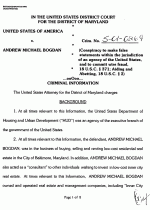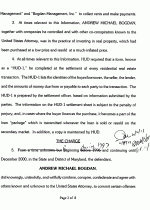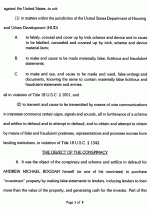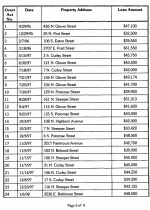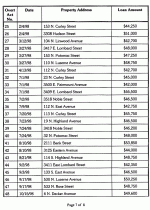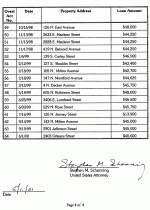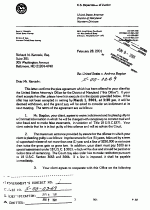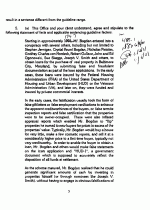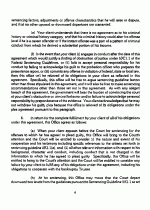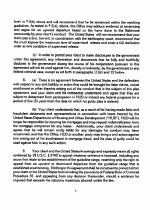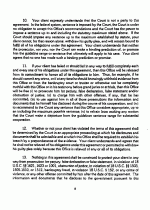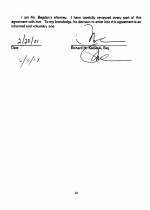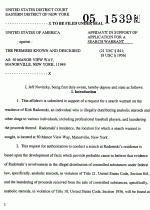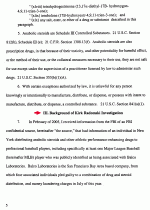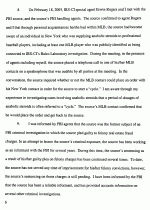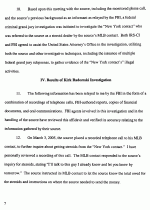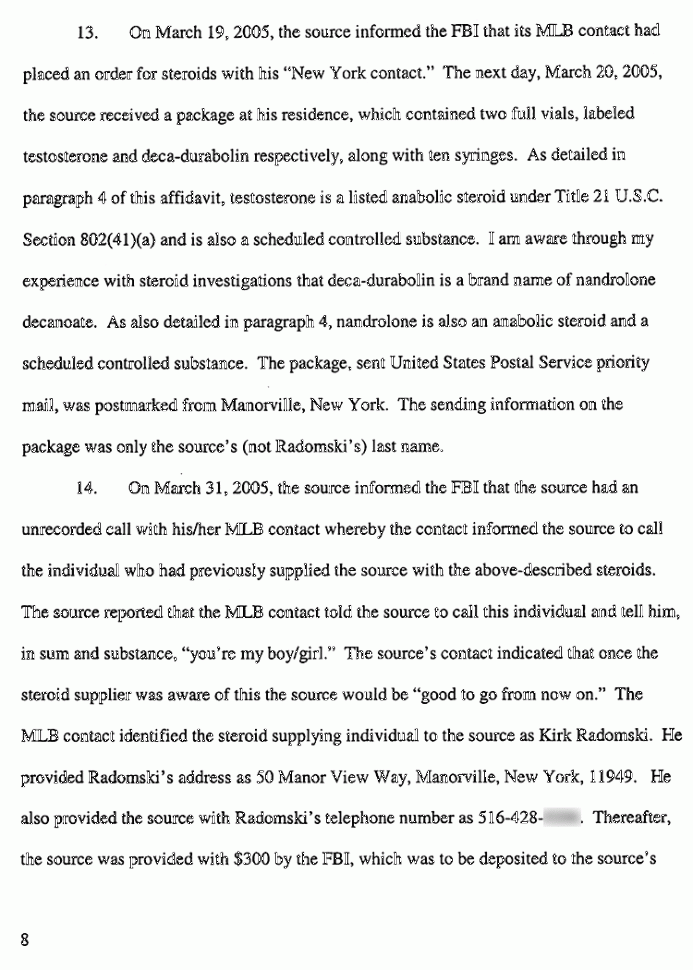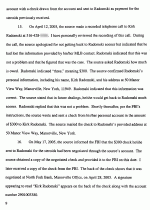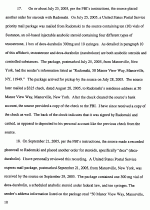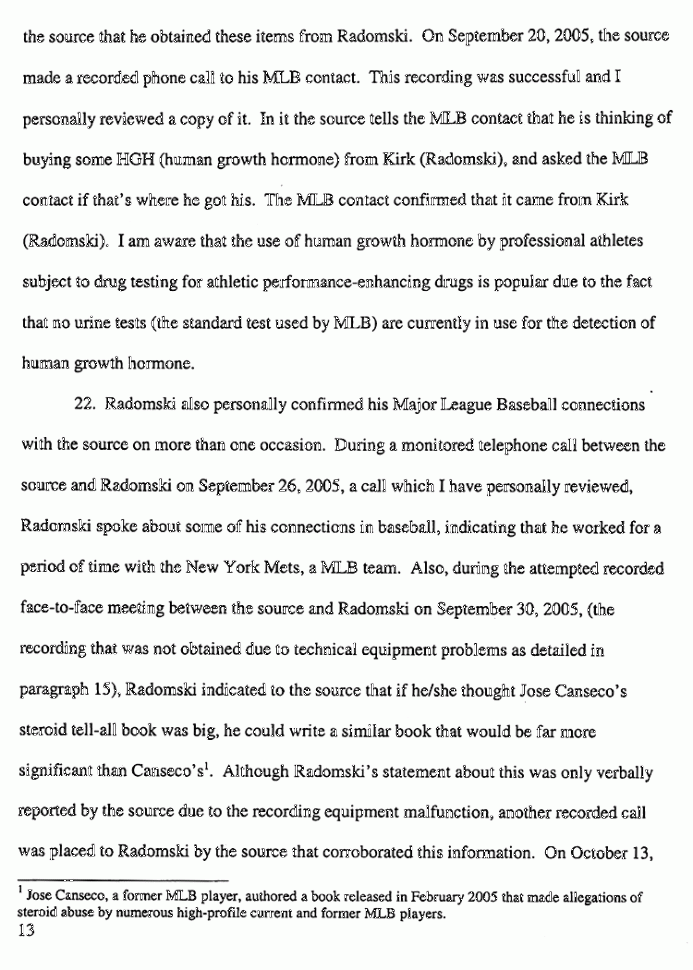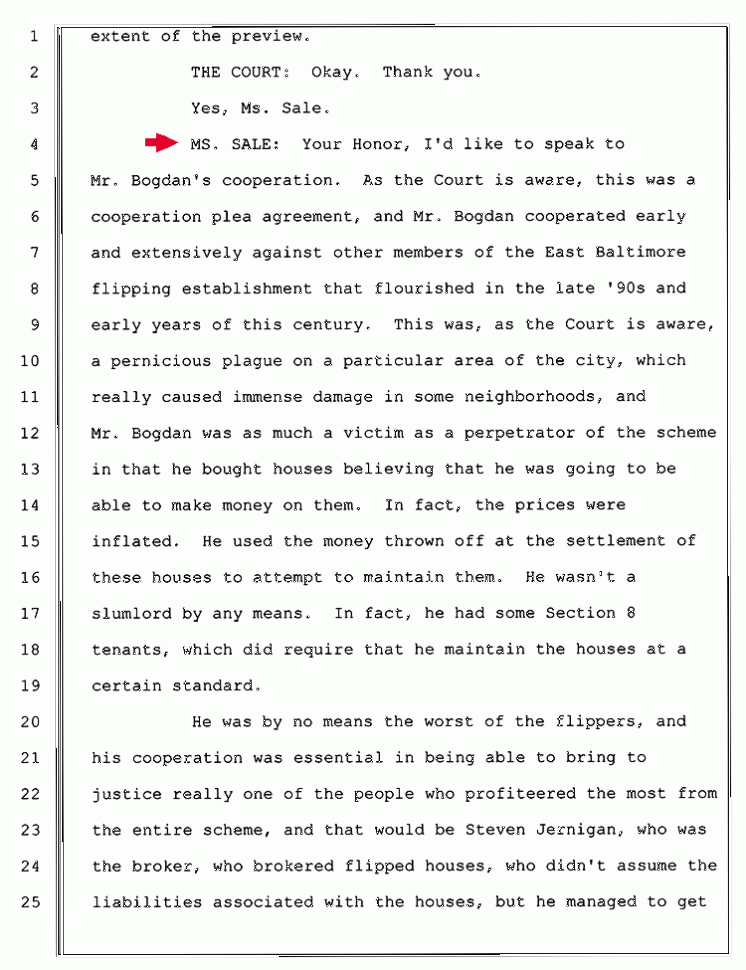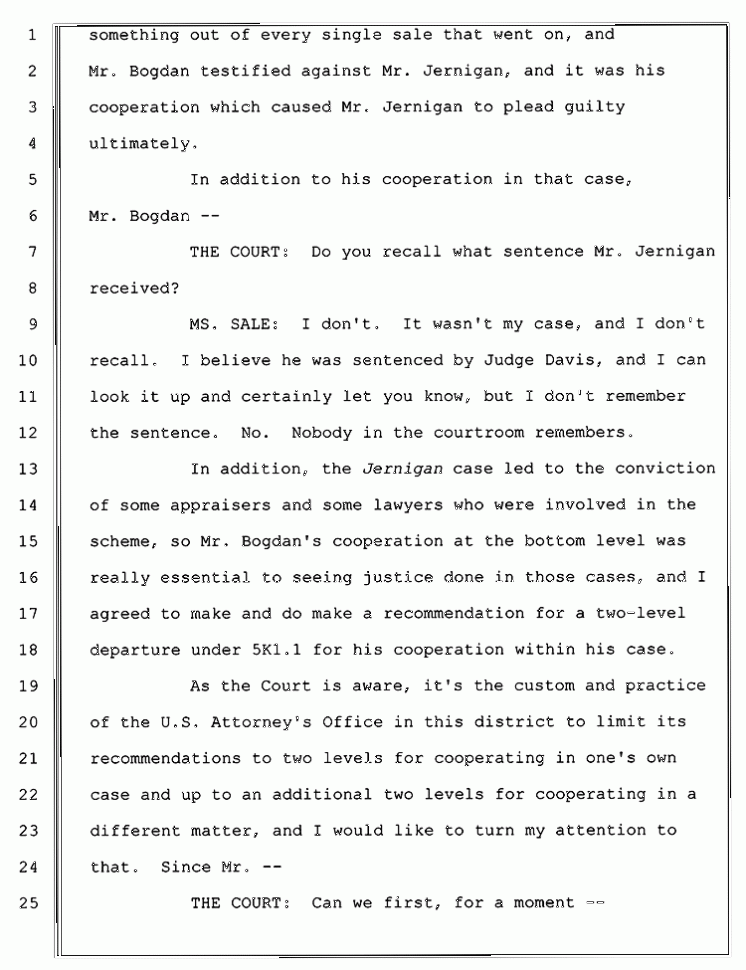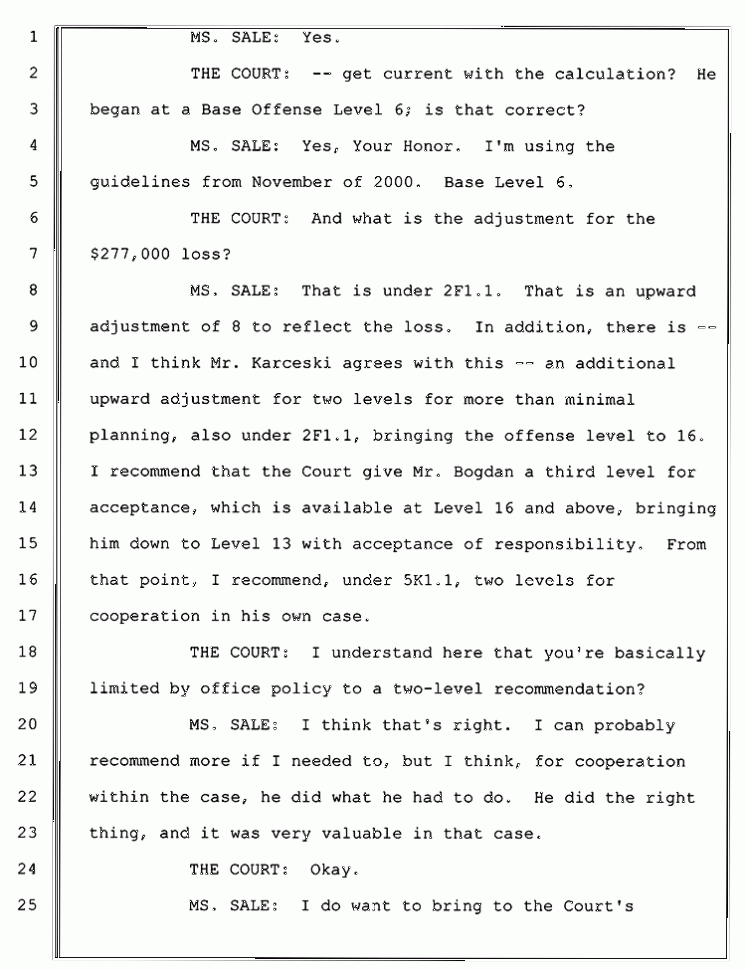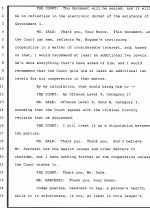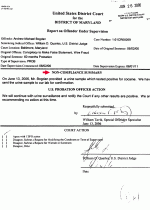Major League Snitch
Unmasked: How a white-collar Baltimore swindler turned secret FBI informant and ignited a Major League Baseball steroid scandal

View Document
Mike Bogdan Criminal Information
-
Mike Bogdan Criminal Information
-
Mike Bogdan Criminal Information
-
Mike Bogdan Criminal Information
-
Mike Bogdan Criminal Information
-
Mike Bogdan Criminal Information
-
Mike Bogdan Criminal Information
-
Mike Bogdan Criminal Information
-
Mike Bogdan Criminal Information
Bogdan Plea Agreement
-
Bogdan Plea Agreement
-
Bogdan Plea Agreement
-
Bogdan Plea Agreement
-
Bogdan Plea Agreement
-
Bogdan Plea Agreement
-
Bogdan Plea Agreement
-
Bogdan Plea Agreement
-
Bogdan Plea Agreement
-
Bogdan Plea Agreement
-
Bogdan Plea Agreement
Kirk Radomski Search Warrant Affidavit
-
Kirk Radomski Search Warrant Affidavit
-
Kirk Radomski Search Warrant Affidavit
-
Kirk Radomski Search Warrant Affidavit
-
Kirk Radomski Search Warrant Affidavit
-
Kirk Radomski Search Warrant Affidavit
-
Kirk Radomski Search Warrant Affidavit
-
Kirk Radomski Search Warrant Affidavit
-
Kirk Radomski Search Warrant Affidavit
-
Kirk Radomski Search Warrant Affidavit
-
Kirk Radomski Search Warrant Affidavit
-
Kirk Radomski Search Warrant Affidavit
Bogdan Cooperation Transcript
-
Bogdan Cooperation Transcript
-
Bogdan Cooperation Transcript
-
Bogdan Cooperation Transcript
-
Bogdan Cooperation Transcript
-
Bogdan Cooperation Transcript
-
Bogdan Cooperation Transcript
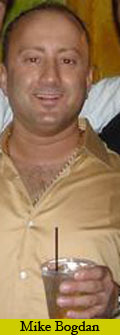 FEBRUARY 4--Even a casual sports fan is by now aware of the key personalities and events of Major League Baseball's ongoing steroid scandal: Roger Clemens, Andy Pettitte, Kirk Radomski, Brian McNamee, Jeff Novitzky, and George Mitchell and his Report.
FEBRUARY 4--Even a casual sports fan is by now aware of the key personalities and events of Major League Baseball's ongoing steroid scandal: Roger Clemens, Andy Pettitte, Kirk Radomski, Brian McNamee, Jeff Novitzky, and George Mitchell and his Report.
However, despite years of saturation coverage of court proceedings, congressional hearings, bloody syringes, and the suspicious abscess on Clemens's buttocks, one key aspect of the steroid probe has remained secret: the identity of the prized FBI informant responsible for its ignition.
The snitch recorded his phone calls with ballplayers, wore a wire to meetings with FBI targets, and ordered steroids and human growth hormone at the direction of federal agents. For a year, he expertly gathered information that would spawn grand jury investigations, government raids, the Mitchell Report, Radomski's felony conviction, and the ongoing criminal probe of Clemens. With brio, he dimed out aquaintances who were unaware that their pal was a convicted felon who, in a bid to avoid a five-year maximum prison sentence, had turned FBI informant and was assiduously working the street.
He proved to be such a prodigious and productive source that he was granted probation when sentenced in mid-2006 on a federal conspiracy conviction. At that time, a veteran prosecutor saluted the informant for keeping "his eyes open for crime occurring about him," and noted that "one of the beauties of cooperation is it sometimes tends to turn people's thinking around. They tend to think of themselves with relation to crime in a different way."
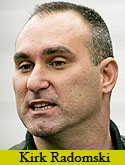 A lengthy TSG probe has identified the talented FBI informant as Andrew Michael Bogdan, a Baltimore resident who cultivated friendships with Orioles ballplayers and then passed on incriminating information about them to his handlers at the bureau. A review of court records and interviews with Bogdan and other sources has allowed TSG to trace the 43-year-old's arc from white-collar criminal to government informant solely responsible for triggering a chain of events that continues to roil baseball.
A lengthy TSG probe has identified the talented FBI informant as Andrew Michael Bogdan, a Baltimore resident who cultivated friendships with Orioles ballplayers and then passed on incriminating information about them to his handlers at the bureau. A review of court records and interviews with Bogdan and other sources has allowed TSG to trace the 43-year-old's arc from white-collar criminal to government informant solely responsible for triggering a chain of events that continues to roil baseball.
Now divorced and living alone in an attached two-story house, Bogdan is out of work, having been laid off last year from his job restocking vending machines. He recently posted a Craigslist ad offering his services as a property manager, but received little response. In a second ad, he sought to sell his Sony sound system (though, in the alternative, Bogdan was willing to trade for a Nintendo Wii). But while he lately has been unable to pay the $100-a-month restitution ordered as a result of his felony conviction, a Mercedes Benz ML350 SUV is parked in the rear driveway of Bogdan's residence (Bogdan says the Benz is not new and its monthly cost is minimal) .
When a reporter visited the modest home on a recent weekday, Bogdan was asleep until nearly noon. Weakened by a hereditary heart problem--he had a cardiac defibrillator implanted about three years ago--Bogdan spends a lot of his time watching television. The box for a new vacuum cleaner--purchased from QVC--was in a back alley waiting to be picked up by garbage men.
When first questioned about his role as a government informant, Bogdan claimed that he did not know what a reporter was talking about. But in several subsequent conversations, he acknowledged working for the FBI, though sought to minimize his role in targeting (and taping) ballplayers with whom he was friendly.
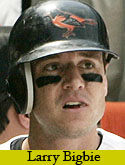 Bogdan, a longtime sports fan and memorabilia collector, spoke wistfully of spending time at Camden Yards, the Orioles's home ballpark. Players, he recalled, would leave tickets for him at the will call window. He would park in the players lot and sit in the section reserved for family and friends of the team. On occasion, he would visit the clubhouse, where, Bogdan said, he would exchange greetings with players like Rafael Palmeiro, Brian Roberts, and Miguel Tejada, and root through a friend's locker while the athlete was showering after a game.
Bogdan, a longtime sports fan and memorabilia collector, spoke wistfully of spending time at Camden Yards, the Orioles's home ballpark. Players, he recalled, would leave tickets for him at the will call window. He would park in the players lot and sit in the section reserved for family and friends of the team. On occasion, he would visit the clubhouse, where, Bogdan said, he would exchange greetings with players like Rafael Palmeiro, Brian Roberts, and Miguel Tejada, and root through a friend's locker while the athlete was showering after a game.
"I walk in the locker room and they knew me," recalled Bogdan. "These were all good times...I miss it. I miss the friendship. But life goes on, people move on."
Some to a new ballclub. Some to the FBI.
***
Mike Bogdan agreed to become an FBI informant in early-2001, immediately after being nabbed for his role in a massive property flipping scam that relied on inflated appraisals and phony documents to illegally obtain about $3 million in government-insured loans.
Bogdan was a landlord (the license plate on his Toyota Tundra read "IRENT2U") who worked with crooked real estate brokers and lawyers to defraud unwitting out-of-state lenders in connection with mortgages issued for dozens of rundown properties in Baltimore's Patterson Park neighborhood. Flipping schemes like Bogdan's disrupt a neighborhood since the homes usually end up in foreclosure (as was the case with the nearly 70 properties in Bogdan's portfolio).
Charged with conspiracy, Bogdan--who already had two bad check convictions and a drunk driving collar on his rap sheet--faced a maximum of five years in federal prison. Though a Department of Justice prosecutor, Barbara Sale, said at the time she would seek "additional prison time based on the harm done to the Baltimore community by Bogdan," according to a report prepared by the Department of Housing and Urban Development's (HUD) inspector general.
Bogdan quickly opted to sign a felony plea agreement and pledged to cooperate with investigators probing mortgage fraud and pernicious flipping schemes targeting what government lawyers termed Baltimore's "low-cost inner city real estate." It was an easy decision, Bogdan recalled. "I was not gonna sit back and allow myself to...be the only one standing there holding the rope," he said. "I was a small minnow in a large, large sea of whales when it came to the real estate stuff." Additionally, Bogdan said that prosecutors promised "they would leave my wife alone" when it came to her involvement in the fraud.
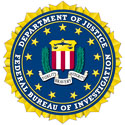 As part of his cooperation, Bogdan met frequently with a series of FBI handlers and testified before grand juries empaneled in the Baltimore federal courthouse. He was a reliable informant and provided accurate information that, over the following years, would result in felony convictions against numerous coconspirators in the real estate fraud.
As part of his cooperation, Bogdan met frequently with a series of FBI handlers and testified before grand juries empaneled in the Baltimore federal courthouse. He was a reliable informant and provided accurate information that, over the following years, would result in felony convictions against numerous coconspirators in the real estate fraud.
And while Bogdan's initial work as a snitch was rather mundane, he eventually took a star turn (secret as it was) relaying information on the distribution of performance-enhancing drugs. No longer focusing on fraudulent sales contracts and falsified HUD-1 forms, Bogdan was suddenly providing FBI agents with crucial information about baseball's steroid pipeline. His information was quickly routed by the bureau to Jeff Novitzky, the IRS agent who led the criminal probe of the Bay Area Laboratory Co-Operative (BALCO) and was the government's chief steroid hunter.
Though trading on the confidences of friends, Bogdan embraced this new avenue of FBI cooperation.
Bogdan's route into baseball began late in the 2003 season when he met Larry Bigbie, an Orioles outfielder then completing his third season in the big leagues. Bogdan said he met Bigbie when the athlete appeared as a guest bartender at Rick's Cafe Americain, a "Casablanca"-themed restaurant popular with Orioles and visiting ballplayers. Bogdan was a regular at Rick's, which, he told TSG, was co-owned by his sister.
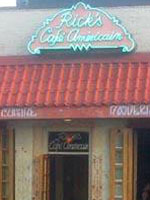 Unlike most of his teammates, Bigbie spent that off-season in Baltimore. An Indiana native who was the 21st overall pick in the 1999 draft, Bigbie trained at Camden Yards with the team's strength and conditioning coach. And he struck up a friendship that winter with Bogdan, who was 12 years his senior and would never be mistaken for a teammate of the 6' 4" athlete. At 5' 9" and 158 pounds, the balding Bogdan was no physical specimen. But, operating from his base at Rick's, he had a knack for befriending athletes and collecting their cell phone numbers.
Unlike most of his teammates, Bigbie spent that off-season in Baltimore. An Indiana native who was the 21st overall pick in the 1999 draft, Bigbie trained at Camden Yards with the team's strength and conditioning coach. And he struck up a friendship that winter with Bogdan, who was 12 years his senior and would never be mistaken for a teammate of the 6' 4" athlete. At 5' 9" and 158 pounds, the balding Bogdan was no physical specimen. But, operating from his base at Rick's, he had a knack for befriending athletes and collecting their cell phone numbers.
In an interview, Bogdan said he took two Baltimore Ravens players to an Orioles opening day, tickets for which Bigbie provided him. He also told of partying with prominent members of the New York Yankees while the team was in Baltimore, and hanging out on occasion with slugger Jason Giambi. He traveled to Florida to visit the Orioles spring training camp, and, through Bigbie, met many of the team's players.
While it is unclear whether these initial interactions were just those of a fan (or those of an informant on a fact-finding mission), Bogdan was in full snitch mode in early-2005. That is when Bigbie made the mistake of telling Bogdan about his use of performance-enhancing drugs, which Bigbie said he obtained from a source in New York.
In response, Bogdan went right to the FBI and prosecutor Barbara Sale with the information (along with heading the criminal division in the U.S. Attorney's Office in Baltimore, Sale is the office's Confidential Human Source Coordinator). In turn, Bogdan's FBI handlers contacted Novitzky with details of what their source had reported. Within days, Novitzky and fellow IRS Agent Erwin Rogers were in Baltimore for a February 18 meeting with Bogdan and his FBI handlers.
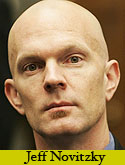 In the presence of Novitzky & Co., Bogdan, on a speakerphone, called Bigbie and asked the player if he could place a steroid order for him with his New York source. Bigbie confirmed that he would place the order and get back to Bogdan. The incongruity of why, all of a sudden, Bogdan needed to start a steroid cycle was not one that apparently troubled the trusting Bigbie.
In the presence of Novitzky & Co., Bogdan, on a speakerphone, called Bigbie and asked the player if he could place a steroid order for him with his New York source. Bigbie confirmed that he would place the order and get back to Bogdan. The incongruity of why, all of a sudden, Bogdan needed to start a steroid cycle was not one that apparently troubled the trusting Bigbie.
While prosecutors quickly opened a grand jury investigation to determine the identity of the New York steroid source, Bogdan beat them to the punch. In late-March, he obtained the New York dealer's name, address, and phone number from Bigbie, who got the okay from the dealer to share his contact information. In short order, Bogdan had parlayed his friendship with Bigbie into the biggest steroid lead since the BALCO investigation.
Kirk Radomski was now in Bogdan's crosshairs.
Over a nine-month period, Bogdan placed five orders for anabolic steroids with Radomski, who shipped the drugs priority mail from his Long Island home. Radomski, not one for subterfuge, usually included his name and address on the "sender" portion of the mailing label. Bogdan, who paid for the steroids with buy money provided by the FBI, recorded his phone calls with Radomski while continuing to tape his conversations with Bigbie.
 A detailed account of how Radomski was reeled in by Bogdan is contained in a December 2005 search warrant application for Radomski's home. However, in an affidavit sworn by Novitzky, which was unsealed a year ago, only Radomski's name appears. Bogdan is cloaked and only referred to as "confidential FBI source" or just "source." Bigbie, also unnamed, appears as the source's "MLB contact."
A detailed account of how Radomski was reeled in by Bogdan is contained in a December 2005 search warrant application for Radomski's home. However, in an affidavit sworn by Novitzky, which was unsealed a year ago, only Radomski's name appears. Bogdan is cloaked and only referred to as "confidential FBI source" or just "source." Bigbie, also unnamed, appears as the source's "MLB contact."
In a brief description of "source," Novitzky stated that the informant was "the former subject of an FBI criminal investigation in which the source pled guilty to felony real estate fraud charges. In an attempt to lessen the source's criminal exposure, the source has been working as an informant with the FBI for several years." Novitzky added that FBI agents considered the source "a reliable informant" who "provided accurate information on several other criminal investigations."
After the Orioles traded Bigbie to the Colorado Rockies in late-July 2005, Bogdan took a September road trip to visit his friend in the Mile High City. Outfitted with an FBI wire that somehow malfunctioned, Bogdan went to Bigbie's apartment and reportedly spoke with him about Radomski's distribution of human growth hormone (HGH). The athlete, Bogdan reported, also showed him his HGH stash and 30 syringes, all obtained from Radomski. And, as Novitzky noted in his affidavit, "The source was able to obtain a used syringe from the MLB contact's trash can, which the source then provided to FBI agents."
 Later that month, Bogdan traveled to New York City for his only face-to-face meeting with Radomski (Bigbie's Rockies were in town for a season-ending series against the Mets). Bogdan was wearing an FBI recording device that again failed due to "technical equipment problems."
Later that month, Bogdan traveled to New York City for his only face-to-face meeting with Radomski (Bigbie's Rockies were in town for a season-ending series against the Mets). Bogdan was wearing an FBI recording device that again failed due to "technical equipment problems."
In his new book "Bases Loaded," Radomski recalls this meeting, but does not name Bogdan, only referring to him as an FBI informant who was a "friend of a friend." Radomski writes that when he picked the friend up at a Manhattan hotel, "I just had a feeling this guy was setting me up." Radomski, of course, had previously sent the friend three separate steroid packages. And, after their meeting in New York, Radomski would go on to mail the friend two additional drug packages. So his retroactive claim that he smelled a rat seems fishy. In a brief interview this morning, Radomski declined to discuss his dealings with Bogdan.
Radomski also writes that instead of shaking the friend's hand, "I hugged him--and while I was doing that I patted him down to see if he was wearing a wire. I didn't feel any wire, but it turned out he was wearing one and I must have knocked something apart because it didn't function."
 This Radomski tale got a laugh out of Bogdan, to whom TSG provided a copy of "Bases Loaded." Bogdan, who read nearly the entire book in a day, said he was never frisked by Radomski and called the claim "entirely hogwash." The two men, Bogdan recalled, shook hands and told each other, "Good to finally meet you." They then went to dinner before heading to Shea Stadium, where they sat together and "chit-chatted" during the game. One topic of discussion was ex-player Jose Canseco's tell-all book about baseball and steroids, according to the Novitzky affidavit. Radomski reportedly remarked that he could write a similar book that "would be far more significant than Canseco's."
This Radomski tale got a laugh out of Bogdan, to whom TSG provided a copy of "Bases Loaded." Bogdan, who read nearly the entire book in a day, said he was never frisked by Radomski and called the claim "entirely hogwash." The two men, Bogdan recalled, shook hands and told each other, "Good to finally meet you." They then went to dinner before heading to Shea Stadium, where they sat together and "chit-chatted" during the game. One topic of discussion was ex-player Jose Canseco's tell-all book about baseball and steroids, according to the Novitzky affidavit. Radomski reportedly remarked that he could write a similar book that "would be far more significant than Canseco's."
In a recorded phone conversation two weeks later, after Bogdan and Radomski discussed another steroid purchase, Bogdan stated, "I'm also looking forward to that fucking best-seller book you're going to write." Radomski replied, "Nah, I'll never do that." Until it was recently mentioned by a TSG reporter, Bogdan was unaware that the fucking book had, in fact, been written by Radomski, the formerly reluctant author.
It almost appears as if the men had been lying to each other.
***
Confronted with the evidence gathered against him, Radomski immediately agreed to cooperate with Novitzky and federal prosecutors. Like Bogdan before him, Radomski began recording his phone conversations with ballplayers and arranged to ship drugs to three athletes, one of whom was Bigbie. After accepting the package from Radomski in what investigators call a "controlled delivery," Bigbie was confronted by federal agents and agreed to cooperate with them (though it is likely that investigators already knew, via Bogdan's tapes, what Bigbie had to offer).
 Asked about Bigbie and Radomski, Bogdan drew a distinction between the two men. Radomski was "the big fish" who got what he deserved. "Biggs," Bogdan noted, was small potatoes, a "good boy." He added, "Nothing was ever deliberately, maliciously, or willfully done to hurt Larry." Bigbie, who spent the 2007 season in the minors, played last year with Japan's Yokohama BayStars, according to a March 2008 Yahoo! Sports story.
Asked about Bigbie and Radomski, Bogdan drew a distinction between the two men. Radomski was "the big fish" who got what he deserved. "Biggs," Bogdan noted, was small potatoes, a "good boy." He added, "Nothing was ever deliberately, maliciously, or willfully done to hurt Larry." Bigbie, who spent the 2007 season in the minors, played last year with Japan's Yokohama BayStars, according to a March 2008 Yahoo! Sports story.
After being reeled in by Bogdan, Radomski provided federal agents with the most detailed account, to date, of steroid use in Major League Baseball. He gave investigators canceled checks, postal records, and other documents that helped substantiate his claims. Radomski also led probers to Brian McNamee, who trained Clemens and Pettitte. McNamee admitted purchasing performance-enhancing drugs from Radomski, and has said that he provided these drugs to Clemens, Pettitte, and ex-New York Yankee Chuck Knoblauch.
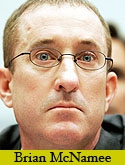 While Pettitte and Knoblauch have both confirmed McNamee's account, Clemens has vehemently denied the trainer's assertion that he administered steroids and HGH to him. In the face of evidence contradicting Clemens's sworn claims made last year before a congressional panel, a federal grand jury is now meeting to consider perjury charges against the retired pitcher.
While Pettitte and Knoblauch have both confirmed McNamee's account, Clemens has vehemently denied the trainer's assertion that he administered steroids and HGH to him. In the face of evidence contradicting Clemens's sworn claims made last year before a congressional panel, a federal grand jury is now meeting to consider perjury charges against the retired pitcher.
Radomski and McNamee also served as the key sources in George Mitchell's December 2007 report on the illegal use of steroids and other performance-enhancing drugs by MLB players. Mitchell's probe was shaping up as a colossal bust until Bogdan delivered Radomski (and by extension McNamee) to federal investigators, who required the duo to cooperate with Mitchell.
With the exception of the Yankees, the team featured most prominently in the Mitchell Report was the Baltimore Orioles (19 current or former players were fingered). The Orioles, of course, had an FBI informant in their midst for about a year.
***
More than five years after signing his plea deal, Bogdan appeared before Judge William Quarles for sentencing in June 2006. After prosecutor Barbara Sale described his cooperation in the property flipping cases, she noted that Bogdan "exceeded his obligations by cooperating beyond his case."
Specifically, Sale reported, Bogdan had done some "very, very significant cooperation" in another district, and that "cooperation is ongoing right up to the moment." [The government's steroid probes have been based out of the Northern District of California, home to Novitzky and the BALCO prosecution team. That is also the district in which Radomski was charged and where McNamee entered into a written cooperation agreement with prosecutors.] Though she did not provide specific details about Bogdan's continuing informant work, Sale referred to the case as "a matter of considerable interest."
In sentencing Bogdan, Quarles granted a government motion for a significant "downward departure" from federal guidelines. He placed Bogdan on five years probation (including drug and alcohol screening) and ordered him to pay restitution of $277,650. Anticipating Bogdan's continuing role as an informant, Sale asked to have Bogdan's probation jointly supervised by the FBI, so that "if Mr. Bogdan is going to go out and be in contact with criminals, that we wouldn't need a separate Court Order every time he's going to go do that."
Bogdan's lawyer, Richard Karceski, assured Quarles that his client would stay out of trouble: "I don't believe...that I've ever met a client that I think I can look you in the eye and talk about and say, 'You're never going to see him here in any kind of situation like this again.'"
 Court records show that 11 days after the sentencing hearing, a probation officer reported that a urine sample provided by Bogdan "tested positive for cocaine." Quarles agreed with the probation official's recommendation to take no action against Bogdan beyond continuing "urine surveillance." Asked in a TSG interview about the positive test, Bogdan said he "never knowingly took cocaine" and surmised that he was somehow exposed to the drug while visiting bars and restaurants in his capacity as a vending machine maintenance worker.
Court records show that 11 days after the sentencing hearing, a probation officer reported that a urine sample provided by Bogdan "tested positive for cocaine." Quarles agreed with the probation official's recommendation to take no action against Bogdan beyond continuing "urine surveillance." Asked in a TSG interview about the positive test, Bogdan said he "never knowingly took cocaine" and surmised that he was somehow exposed to the drug while visiting bars and restaurants in his capacity as a vending machine maintenance worker.
He chalked up the dirty urine to some kind of "cross-contamination," adding that cocaine could easily prove deadly since, "I have the heart of an 85-year-old man."
Despite Sale's comments at sentencing about his continuing role as an informant, Bogdan said that he had not been in contact with his FBI handlers for a couple of years, adding that he only touched base with the bureau late last month after a reporter turned up at his doorstep.
And as for the prosecutor's remarks that seemed to portray him as something of a SuperSnitch, Bogdan took exception. "If she thinks I'm gonna go out and start playing Deputy Dawg and Crime Solvers USA, that's not happening," he said. Bogdan then voiced what appears to be a new outlook on life. "I'm a firm believer in whatever people do, people do. Doesn't affect me, it's not my business," he said.
***

